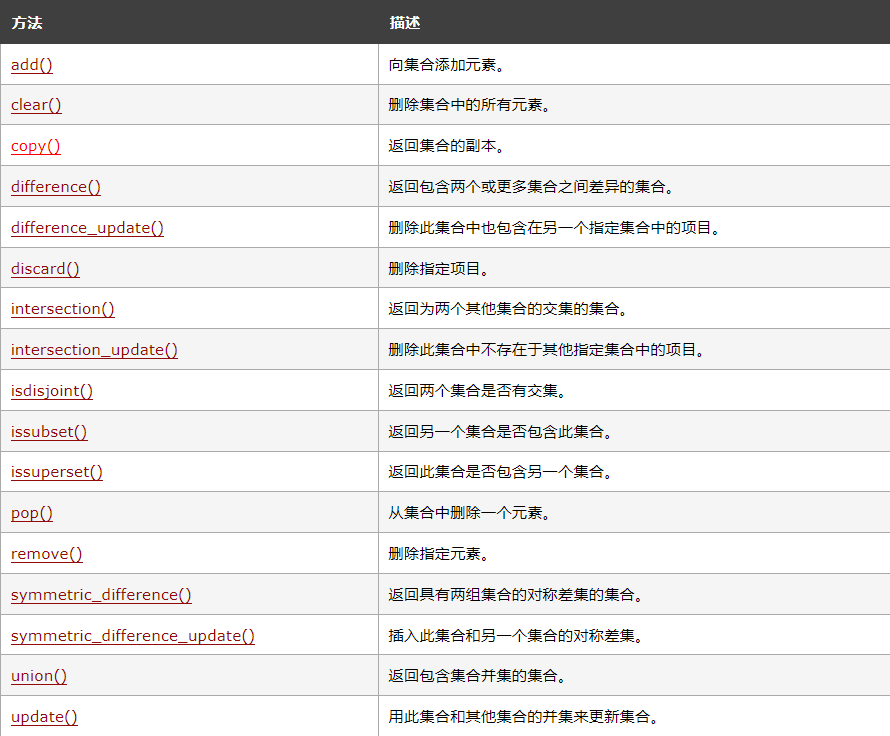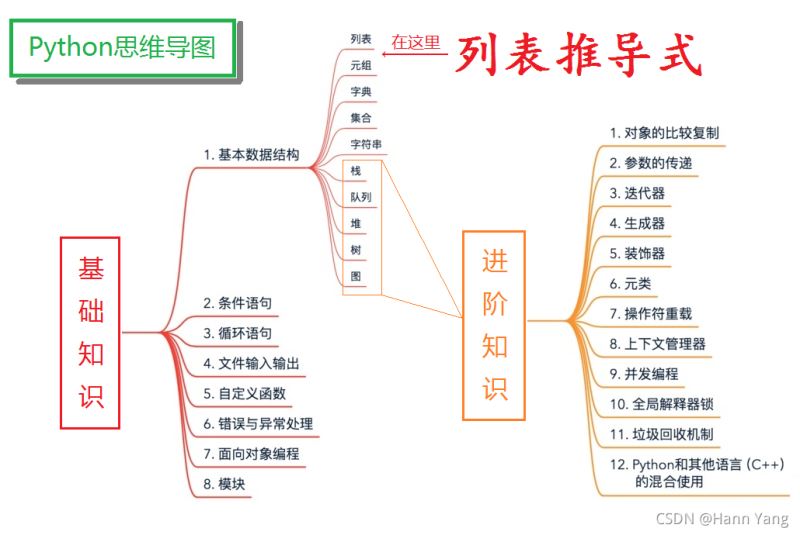集合(Set)
集合是无序和无索引的集合。在 Python 中,集合用花括号编写。
实例
创建集合:
thisset = {"apple", "banana", "cherry"}
print(thisset)
运行实例

注释:集合是无序的,因此您无法确定项目的显示顺序。
访问项目
您无法通过引用索引来访问 set 中的项目,因为 set 是无序的,项目没有索引。
但是您可以使用 for 循环遍历 set 项目,或者使用 in 关键字查询集合中是否存在指定值。
实例
遍历集合,并打印值:
thisset = {"apple", "banana", "cherry"}
for x in thisset:
print(x)
运行实例

实例
检查 set 中是否存在 “banana”:
thisset = {"apple", "banana", "cherry"}
print("banana" in thisset)
运行实例
更改项目
集合一旦创建,就无法更改项目,但是可以添加新项目。
添加项目
要将一个项添加到集合,请使用 add() 方法。
要向集合中添加多个项目,请使用 update() 方法。
实例
使用 add() 方法向 set 添加项目:
thisset = {"apple", "banana", "cherry"}
thisset.add("orange")
print(thisset)
运行实例

实例
使用 update() 方法将多个项添加到集合中:
thisset = {"apple", "banana", "cherry"}
thisset.update(["orange", "mango", "grapes"])
print(thisset)
运行实例

获取 Set 的长度
要确定集合中有多少项,请使用 len() 方法。
实例
获取集合中的项目数:
thisset = {"apple", "banana", "cherry"}
print(len(thisset))
运行实例

删除项目
要删除集合中的项目,请使用 remove() 或 discard() 方法。
实例
使用 remove() 方法来删除 “banana”:
thisset = {"apple", "banana", "cherry"}
thisset.remove("banana")
print(thisset)
运行实例

注释:如果要删除的项目不存在,则 remove() 将引发错误。
实例
使用 discard() 方法来删除 “banana”:
thisset = {"apple", "banana", "cherry"}
thisset.discard("banana")
print(thisset)
运行实例

注释:如果要删除的项目不存在,则 discard() 不会引发错误。
还可以使用 pop() 方法删除项目,但此方法将删除最后一项。请记住,set 是无序的,因此您不会知道被删除的是什么项目。
pop() 方法的返回值是被删除的项目。
实例
使用 pop() 方法删除最后一项:
thisset = {"apple", "banana", "cherry"}
x = thisset.pop()
print(x)
print(thisset)
运行实例

注释:集合是无序的,因此在使用 pop() 方法时,您不会知道删除的是哪个项目。
实例
clear() 方法清空集合:
thisset = {"apple", "banana", "cherry"}
thisset.clear()
print(thisset)
运行实例

实例
del 彻底删除集合:
thisset = {"apple", "banana", "cherry"}
del thisset
print(thisset)
运行实例

合并两个集合
在 Python 中,有几种方法可以连接两个或多个集合。
可以使用 union() 方法返回包含两个集合中所有项目的新集合,也可以使用 update() 方法将一个集合中的所有项目插入另一个集合中:
实例
union() 方法返回一个新集合,其中包含两个集合中的所有项目:
set1 = {"a", "b" , "c"}
set2 = {1, 2, 3}
set3 = set1.union(set2)
print(set3)
运行实例

实例
update() 方法将 set2 中的项目插入 set1 中:
set1 = {"a", "b" , "c"}
set2 = {1, 2, 3}
set1.update(set2)
print(set1)
运行实例

注释:union() 和 update() 都将排除任何重复项。
还有其他方法将两个集合连接起来,并且仅保留重复项,或者永远不保留重复项,请查看此页面底部的集合方法完整列表。
set() 构造函数
也可以使用 set() 构造函数来创建集合。
实例
使用 set() 构造函数来创建集合:
thisset = set(("apple", "banana", "cherry")) # 请留意这个双括号
print(thisset)
运行实例

Set 方法
Python 拥有一套能够在集合(set)上使用的内建方法。

到此这篇关于Python入门教程(十四)Python的集合的文章就介绍到这了,更多相关Python 集合内容请搜索好代码网以前的文章或继续浏览下面的相关文章希望大家以后多多支持好代码网!




